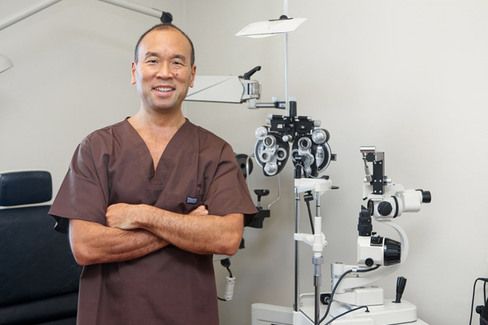Advanced Treatment for Cataracts
Cataracts can dramatically affect your field of vision, and the only permanent solution is cataract surgery. Cataract surgery is one of the safest, most successful surgical treatments available and complications are very rare. Dr. Jason H. Nakagawa and his team can assess your vision and determine if the time is right for surgery. A trusted network of surgeons works closely with Dr. Nakagawa to ensure the best possible outcomes.
When to Have Cataract Surgery
Not all patients who have cataracts will need surgery right away. However, you should consider cataract surgery if you are experiencing:
- Blurry vision
- Difficulty driving at night
- Inflammation or increased intraocular pressure, which can lead to glaucoma
When your cataracts begin to interfere with your quality of life, you should consider undergoing cataract surgery.
Pre-operative Routine
During your appointment, Dr. Nakagawa will carefully evaluate your vision and perform a series of specialized tests, including:
- Glare testing: During your contrast sensitivity testing, we will shine a glare source towards your eyes to evaluate how your cataracts affect your ability to distinguish images from their background.
- Anterior chamber optical coherence tomography: This exam can reveal preexisting retinal diseases and glaucoma prior to cataract surgery, which can help your doctor plan your procedure and establish expectations.
- Biomicroscopy: By focusing a slit lamp on your eye, Dr. Nakagawa can observe the eyelid, sclera, conjunctiva, iris, lens, and cornea through a biomicroscope to assess the health of your eyes.
- Intraocular pressure testing: After numbing your eyes, Dr. Nakagawa will apply a small amount of pressure to your eyes to measure their internal pressure.
Cataract Surgery
If he determines that you are a candidate for cataract surgery, Dr. Nakagawa will refer you to a trusted ophthalmologist. If both of your eyes have cataracts, the surgeries will typically be performed a few weeks apart. During surgery, the ophthalmologist will create a few small incisions on your cornea. He or she will then use a laser or ultrasound probe to break down your clouded lens for easier removal. After removing the clouded lens, your surgeon will replace your natural lens with an intraocular lens (IOL).

Recovering from Cataract Surgery
Dr. Nakagawa and his team are available to guide you through your recovery and evaluate your progress after your surgery. Some itching and discomfort are normal, but these and other symptoms should subside within a few days. To promote a healthy recovery, make sure to take any medications or eyedrops as prescribed and avoid rubbing your eyes. Most patients are fully healed from cataract surgery within eight weeks.
Our team can check for cataracts, pair you with a trusted surgeon, and track your progress during your recovery.
Long-Term Outlook
Dr. Nakagawa will monitor your vision after your surgery. It will take a few months for your eyes to adjust to the IOLs. Although premium IOLs allow some patients to achieve freedom from glasses or contacts following cataract surgery, we can help you get new eyeglasses or contact lenses if you still need them for reading fine print or focusing on faraway objects.
Schedule an Evaluation
Our team can check for cataracts, pair you with a trusted surgeon, and track your progress during your recovery. Dr. Nakagawa can also help diabetic patients, who are at higher risk of cataracts. To learn more about your treatment options, call us at (310) 340-6925 or schedule an appointment online.
Dr. Jason H. Nakagawa

Dr. Nakagawa has been practicing optometry since 1994. He is a member of multiple prestigious organizations, including:
- American Academy of Optometry
- American Optometric Association
- National Optometric Association
- The National Association of Patient Practitioners
- American Diabetes Association
